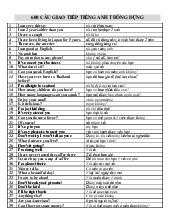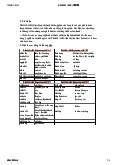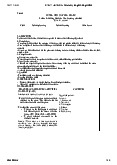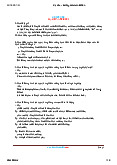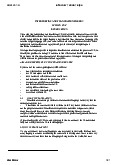



















Preview text:
23:38 28/7/24
Bài 1. Tiếng Anh nâng cao I. Influencer Marketing Reading the News 1 about:blank 1/30 23:38 28/7/24
Bài 1. Tiếng Anh nâng cao I. Influencer Marketing about:blank 2/30 23:38 28/7/24
Bài 1. Tiếng Anh nâng cao I. Influencer Marketing
Nguyễn Thị Cát Ngọc - Đỗ Thị Thu Phượng (Đồng chủ biên)
Trịnh Minh Phương - Nguyễn Hồng Thúy - Trần Thị Thu Thương READING THE NEWS 1
NHÀ XUẤT BẢN ĐẠI HỌC QUỐC GIA HÀ NỘI about:blank 3/30 23:38 28/7/24
Bài 1. Tiếng Anh nâng cao I. Influencer Marketing about:blank 4/30 23:38 28/7/24
Bài 1. Tiếng Anh nâng cao I. Influencer Marketing CONTENTS
ACKNOWLEDGEMENTS ......................................................................................................7
PREFACE TO THE READING THE NEWS SERIES ..........................................................8
INTRODUCTION ....................................................................................................................9
NOTES TO USERS .................................................................................................................12
MEDIA LITERACY ................................................................................................................14
SECTION 1. NEWS AND FEATURES...............................................................................20
UNIT 1. Influencer Marketing ..........................................................................................22
UNIT 2. Climate Change....................................................................................................31
UNIT 3. Social Media and National Security ..................................................................38
UNIT 4. Higher Education and Finance ..........................................................................46
UNIT 5. Environmentalism ...............................................................................................53
UNIT 6. Pursuit of Music Career ......................................................................................61
SECTION 2. OPINION .........................................................................................................69
UNIT 7. Exploring the World ............................................................................................70
UNIT 8. E-Commerce ........................................................................................................79
UNIT 9. The Future of Foods ............................................................................................87
UNIT 10. Freedom of Information ...................................................................................94
UNIT 11. Vaccination .......................................................................................................103
UNIT 12. Public Opinions ...............................................................................................111
LIST OF REFERENCES ......................................................................................................119 about:blank 5/30 23:38 28/7/24
Bài 1. Tiếng Anh nâng cao I. Influencer Marketing about:blank 6/30 23:38 28/7/24
Bài 1. Tiếng Anh nâng cao I. Influencer Marketing ACKNOWLEDGEMENTS
We are appreciative of assorted sources of information and authors of the articles cited
in Reading the News 1 coursebook. Without all of them, we would not have been able to
compile the materials for this book.
We are grateful to our English Faculty, Board of Education and Training, Board of
Directors for facilitating the compilation of this coursebook.
Our sincere thanks go to our English Faculty members, coordinators and students who
have made substantive contribution to the meticulous compilation process. We also
thank the editorial personnel, who was a great help for us in getting the manuscript in publishable form.
Despite all the help we had, many errors and shortcomings may remain in the following
pages; for these we alone are responsible. about:blank 7/30 23:38 28/7/24
Bài 1. Tiếng Anh nâng cao I. Influencer Marketing
PREFACE TO THE READING THE NEWS SERIES
As many language teachers and learners now realize, reading is not simply an important
skill. It is also a critical basis for progress in language learning. Effective reading skill
enhances students’ abilities to pay attention, remember new grammar and vocabulary,
process ideas, and respond appropriately. As students develop their reading abilities, they
feel more capable and confident in all aspects of language use.
Students at different levels need different kinds of reading skills and strategies, but most
eventually encounter the need for academic reading. More than merely enabling them to
succeed in college lectures and discussions, effective academic reading allows students
to build, synthesize and use knowledge in the target language. As a result, they can fully
participate in the exchange of authentic ideas about relevant topics.
Recent progress in language teaching and testing has provided many new instructional
approaches and strategies that help students develop good academic reading skills.
Reading the News incorporates these new ideas into a coherent, carefully sequenced
approach that works well in classrooms.
Authentic Language and Active Reading
Each level of the series Reading the News comprises twelve units on specific topics
which are accessible to students of all backgrounds. The articles selected are written in
an interactive style that models the natural, authentic language as well as active reading.
Key points are reinforced so that students can remember easier.
The activities that accompany each unit are designed to guide the reading process. Students
are encouraged to preview vocabulary, read with a clear purpose, extract main ideas,
understand text organization, check comprehension, deal with unfamiliar words, link
ideas, understand writer’s style, evaluate the text, react to the text, and write summary.
The activities also help students develop critical thinking skills, including: • Activating prior knowledge
• Guessing meaning from context • Predicting information • Organizing ideas
• Discriminating between main ideas and details
• Reconstructing and summarizing main ideas
• Transferring knowledge from each topic to other areas about:blank 8/30 23:38 28/7/24
Bài 1. Tiếng Anh nâng cao I. Influencer Marketing INTRODUCTION READING THE NEWS 1
Reading the News 1 is the first coursebook in the series of Reading the News. The book
is suitable for those who possess level B1-B2 in Vietnamese Standardized Test of English
Proficiency, i.e. they can use the language independently and communicate without effort
with native speakers. In English curriculum, the coursebook is primarily designed for
sophomores who begin their ESP course at Diplomatic Academy of Vietnam. It consists
of 12 units based on topics of common interest in international studies. This book features
authentic texts reflecting the recent trends of the world. The book is expected to help
students enhance their ability to read the news in English effectively. READING EFFECTIVELY
Everyone reads with some purposes in mind: for instance, to keep up with the news, to
obtain specific information, or simply for pleasure. A reader’s purpose may also include
the need to reproduce the content of the text in some way or other: in a discussion of the
ideas it contains, for example; or in summarizing the text for a report or an examination.
Effective reading means being able to read accurately and efficiently, understanding as
much of a text as one needs in order to achieve one’s purpose. Not everybody can do this
even in his or her own language. In a foreign language, the problems are of course greater,
and comprehension failure is common. This may be a simple matter of not knowing a
word, but it is equally likely to be due to a deficiency in one or more of a number of
specific reading techniques. The exercises in this book can also help students develop these specific techniques. Extracting main ideas
Sometimes it is difficult for a student to see what the main ideas of a passage are, or
to distinguish between important and unimportant information. Students should be
encouraged to read for the general sense rather than for the meaning of every word.
Reading for specific information
It is not always necessary to read the whole of a text, especially if one is looking for
information which is needed for a specific purpose.
Understanding text organization
Students may sometimes have trouble in seeing how a passage is organized. They should
have practice in recognizing how sentences are joined together to make paragraphs, how
paragraphs are combined into text, and how this organization is signaled. Predicting
Before reading a text, we usually subconsciously ask ourselves what we know about the
subject matter. This makes it easier to see what information is new to us and what we about:blank 9/30 23:38 28/7/24
Bài 1. Tiếng Anh nâng cao I. Influencer Marketing 10 Reading the News 1
already know, as we read the passage. If we can transfer this skill to a foreign language,
we can ensure that as we read we are not overloaded with too much new information. Checking comprehension
Under certain circumstances (such as examinations) students may need to study a passage
very closely in order to answer a question correctly, and exact understanding of points of
detail may be crucial. Comprehension questions in each unit could train students in this kind of careful reading. Inferring
A writer may decide to suggest something indirectly rather than state it directly. The reader
is required to infer this information – which may be essential for correct understanding.
Some students may need practice in seeing such implications.
Dealing with unfamiliar words
One of the commonest problems facing a student is simply not being able to understand a
word or expression. But it is often possible to guess its general sense by looking for clues,
whether in the context or in the form of the word itself. The exercise of explaining words
and expressions as used in the article will help develop the techniques needed to make
reasoned guesses about the meaning of new vocabulary. Linking ideas
In any passage an idea may be expressed by a number of different words or expressions.
It is necessary for students to see how different words are related to the same idea.
Understanding complex sentences
Some writers, consciously or unconsciously, use a complicated style in which it may be
difficult, for example, to distinguish main clauses from subordinate clauses. Struggling
with complex syntax can make it easy to lose sight of the general sense of the text. Students
should learn how to “decode” long and complicated sentences.
Understanding writer’s style
An important part of the pleasure in reading is being able to appreciate why a writer
chooses a certain word or expression and how he/she uses it. A number of stylistic devices
and features are presented in this book. Evaluating the text
A full understanding of a passage may depend on appreciating why it was written, or what
purpose particular parts of the text serve. It may, for instance, be important to distinguish
between a statement of fact and an expression of the writer’s opinion. Students are
expected to develop the students’ more critical faculties. about:blank 10/30 23:38 28/7/24
Bài 1. Tiếng Anh nâng cao I. Influencer Marketing Reading the News 1 11 Reacting to the text
Sometimes a reader’s interpretation of a passage may be colored by his or her own views
on the subject being dealt with. Students should learn how to separate what the writer says from what the reader thinks. Writing summaries
The ability to write an accurate summary requires accurate comprehension of a passage,
the ability to distinguish between essential and secondary information, and skill in
composing clear, economical text. For students who need this technique (which is
required, for instance, for the examination) special training is provided. ORGANIZATION OF UNITS
There are 12 units in the coursebook, each devoted to one article. The articles are graded
in the order from News and Features to Opinion in different themes. Pre-reading tasks
Students are offered a variety of interesting activities in which they discuss the topic of
the unit and exchange ideas about it. Reading focus
Students are provided with a particular style of giving information in each article. They will
learn how to recognize different types of information or different ways to present ideas.
Understanding the article
Students will read adapted articles on a variety of topics on specific themes from different
newspapers. They will develop their reading skills and learn essential vocabulary and
structures. They will also be able to discuss the ideas and issues in the articles. Vocabulary work
Students will learn important new words and phrases which they can use when carrying
out the tasks in the unit. A good dictionary will also help them to increase their vocabulary. Exam preparation tasks
Students are equipped with specific skills and strategies to deal with the tasks they will
encounter in their progress and final examinations of the course. Discussion prompts
Students will build up their confidence in using English and improve their fluency through discussion activities. Extra reading
Each unit has one extra reading with similar theme to offer students more sources to study. about:blank 11/30 23:38 28/7/24
Bài 1. Tiếng Anh nâng cao I. Influencer Marketing 12 Reading the News 1 NOTES TO USERS
TO STUDENTS AND SELF-STUDY LEARNERS
As you have read the introduction, the objective of this coursebook is to help students
read effectively through tasks. It is also important that you should follow these distinct
stages to make full use of this book.
Stage 1. Preparation
Before you come to each reading class, the following activities may help you approach the article better:
• Do research on the topic of the unit by reading related information about it. You can
also do the activities in Pre-reading tasks of each unit.
• Make notes or create a mind-map about the topic.
• Summarize your views/ feelings or findings by writing a review.
• Make a small talk or presentation on what you have researched in class or with your peer.
This process will help you to become familiar with the theme or the topic of the text.
The second part of this Stage concerns vocabulary. Write a list of words related to the
theme of the unit that you come across while you do research with their meaning in
English. You can even create your own glossary about the topic for your reference.
Stage 2. Task completion
You can do each task in the unit and try to find your answer in the article. You can discuss
your ideas, feelings and thoughts with your peer to get a proper answer for each question.
Use the highlight pen to mark the clues in the article to help you answer the question.
While you read the article, you should:
• Try not to depend much on the dictionary.
• Try to understand unfamiliar words using the context. You may also need to explain
the words/expressions using your own words.
• Read the article carefully to grasp the meaning the author wants to convey. about:blank 12/30 23:38 28/7/24
Bài 1. Tiếng Anh nâng cao I. Influencer Marketing Reading the News 1 13
To do these, you need some reading skills that can only mastered through practice,
namely, scanning, skimming, reading through title, reading through sub-title, and reading for details. Stage 3. Reflection
In this stage, you can consolidate what you have learned by:
• Add more words you have learned from the article into your own word list or glossary
• Write a short note or give a small talk on your own or discussion with your peer
about what you have read from the article
• Read more articles of the similar topic in order to have a more thorough understanding about it TO THE TEACHER
In teaching with Reading the News 1, teachers should remember that the aims of this book
are to help students read effectively, express ideas about topics of the units and explore their
self-study capacity. In order to meet these aims, teachers should also follow these stages:
Stage 1: Preparation
At this first stage, teachers should help students prepare for the article they are going to
read by assigning them to do research at home, giving discussion questions beforehand or
even asking them to make a presentation about the topic of the article.
Stage 2: Task completion
Teachers can guide students to do each task in the unit by giving some tips or skills to
help them read faster and look for the information more efficiently. Some common skills
are scanning and skimming, key words search, paraphrasing, predicting, determining author’s view or facts…
Teachers should also facilitate students with ideas for the discussion or assign students to
lead the discussion about the topic of the unit. Teachers should let students be centered in
their discussion and encourage them to freely express their ideas. Stage 3: Reflection
Teachers should wrap up the class and guide students to the next lesson’s preparation by
assigning them with pre-reading or doing research tasks. More discussions or extra read- ing tasks can be given.
Teachers can also provide students with more sources for reading and ask them to write a
review or make notes on what they have read. about:blank 13/30 23:38 28/7/24
Bài 1. Tiếng Anh nâng cao I. Influencer Marketing about:blank 14/30 23:38 28/7/24
Bài 1. Tiếng Anh nâng cao I. Influencer Marketing about:blank 15/30 23:38 28/7/24
Bài 1. Tiếng Anh nâng cao I. Influencer Marketing about:blank 16/30 23:38 28/7/24
Bài 1. Tiếng Anh nâng cao I. Influencer Marketing about:blank 17/30 23:38 28/7/24
Bài 1. Tiếng Anh nâng cao I. Influencer Marketing about:blank 18/30 23:38 28/7/24
Bài 1. Tiếng Anh nâng cao I. Influencer Marketing about:blank 19/30 23:38 28/7/24
Bài 1. Tiếng Anh nâng cao I. Influencer Marketing about:blank 20/30
